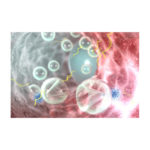 Researchers from the Massachusetts Institute of Technology and Brigham & Women’s Hospital have developed a technique to deliver strands of RNA to colon cells using bursts of ultrasound waves. The team’s technique turned down the production of a protein involved in inflammatory bowel disease in mice.
Researchers from the Massachusetts Institute of Technology and Brigham & Women’s Hospital have developed a technique to deliver strands of RNA to colon cells using bursts of ultrasound waves. The team’s technique turned down the production of a protein involved in inflammatory bowel disease in mice.
The paper, which was published in Gastroenterology, described a simple method of delivering nucleic acids to cells – a task which has proven difficult in previous studies.
“What we saw in this paper was the ultrasound can enable rapid delivery of these molecules,” lead author Carl Schoellhammer said in a prepared statement. “In this case it was proinflammatory molecules that we were shutting off, and we saw tremendous knockdown of those proteins.”
“Having the ability to deliver large amounts of this material, which is not modified in any way, really opens up the possibility to have a positive impact on patients down the line,” Giovanni Traverso, a research affiliate at the Koch Institute & gastroenterologist at Brigham and Women’s Hospital, added.
Sections of RNA known as short interfering RNA can be used to silence specific genes, but because RNA breaks down in the GI tract, most researchers focus their efforts on packaging the siRNA into particles to protect it from degradation.
Instead of packaging the RNA, the team from MIT & Brigham used ultrasound waves to escort the RNA into the cells rapidly through a process known as transient cavitation. At low frequencies, ultrasound waves produce tiny bubbles that create tiny jets when they burst, pushing the RNA strands into cells.
The team used transient cavitation to send short strands of RNA that stop the production of a protein called tumor necrosis factor alpha in mice with colitis. The RNA was delivered by enema in a solution of water, while the researchers used a small probe to deliver a burst of low-frequency ultrasound.
Mice that received nucleic acids via ultrasound showed a 7- to 10-fold reduction in TNFa levels and the inflammation nearly disappeared, according to the team. RNA delivered alone, however, had no affect.
“This approach has the potential to enhance both the efficacy and the safety of blocking current targets, such as TNF, by allowing both reduction of the effective dose and systemic exposure. However, much additional work needs to be done to bring ultrasound-mediated delivery of RNA-based therapies to practical clinical application,” Bruce Sands, chief of the division of gastroenterology at the Icahn School of Medicine, said. Sands was not involved in the study.
The team has formed a company, Suono Bio, to develop the technology and get it to patients suffering from IBD.
“There aren’t that many treatment options for these patients,” Traverso said. “The ability to deliver RNA opens up essentially the entire genome for potential targets.”
“Now you can take the RNA strand, and without doing any formulation, you can immediately put it into an animal, hit that target, and get your readout of whether it has any effect on disease,” Schoellhammer said.
The team is working on creating a miniaturized device that would carry drugs in a reservoir while simultaneously emitting ultrasound waves for delivery to the GI tract.

